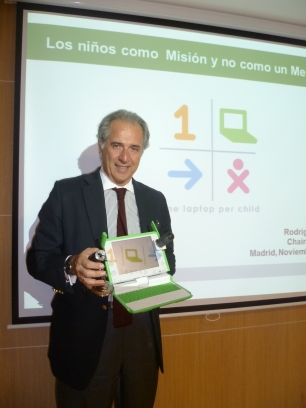Pablo Mandeville
The viewpoints expressed hereunder do not necessarily reflect the opinion of OLPC.
This page was created by a member of the free volunteer community supporting OLPC.
One of the top people at OLPC, e.g. in 2014 he's still the Chairman and CEO OLPC. More: http://laptop.org/about/people/rodrigo-arboleda-halaby
From: http://ht.ly/uN6ip
"X: Looking back on your experiences, what are the key lessons learned? What is the overarching challenge for the world of connected devices and education, especially in emerging countries?
RA: We never foresaw the incredible opposition we would encounter from commercial entities. When a commercial entity acquires 90 percent market share of any product or service, they tend to feel entitled to that position of privilege. They view any opposing idea as a threat to their dominance and hegemony, and they react viciously, mercilessly, with the only intention in mind of crushing any potential future questioning of their privilege. But in the end, they do not hurt a non‐profit foundation like ours, they hurt a generation of children that see their dreams and aspirations delayed.
The challenge is to change the mindset of cultures, bureaucracies. Most of that has to do with the lobbying efforts of commercial entities that whisper into the ears of governments that “size matters,” or “more and bigger is better.” A child in a remote village of sub‐Saharan Africa does not need a 256 GB hard drive, or a heavy, 10-inch screen-size laptop. The readability of the screen and the low energy consumption are more important concepts to apply. This is why we are teaming up with companies like Datawind in order to keep moving prices down, so the base of the pyramid is expanded. This is the way to fulfill our dream of incorporating 1 billion children left in the medieval obscurantism in which generations of their ancestors have lived, into the 21st century as effective members of a global society. What Nicholas announced Monday at TED on the occasion of their 30th anniversary is precisely the type of advocacy we should and can do.
The world needs a group like OLPC to maintain a healthy balance between commercial interests and human interests. Seven years ago, Nicholas proposed at the ITU in Geneva the idea that Internet access in public schools in the world should be free of charge because that could be considered a basic human right of children in today’s digital world. They almost crucified him there. All the telecom companies saw the writing on the wall about their profits plummeting and revolted angrily. Well, today, Facebook is promoting Internet.org (whom we happily have joined). They have 1.3 billion subscribers. We were advocating, from the very beginning, a solution to 1+ billion children. These orders of magnitude make of us ideal advocates. These are worldwide movements. This is the arena where we belong. This is where we thrive and grow. "
Suggested links:
